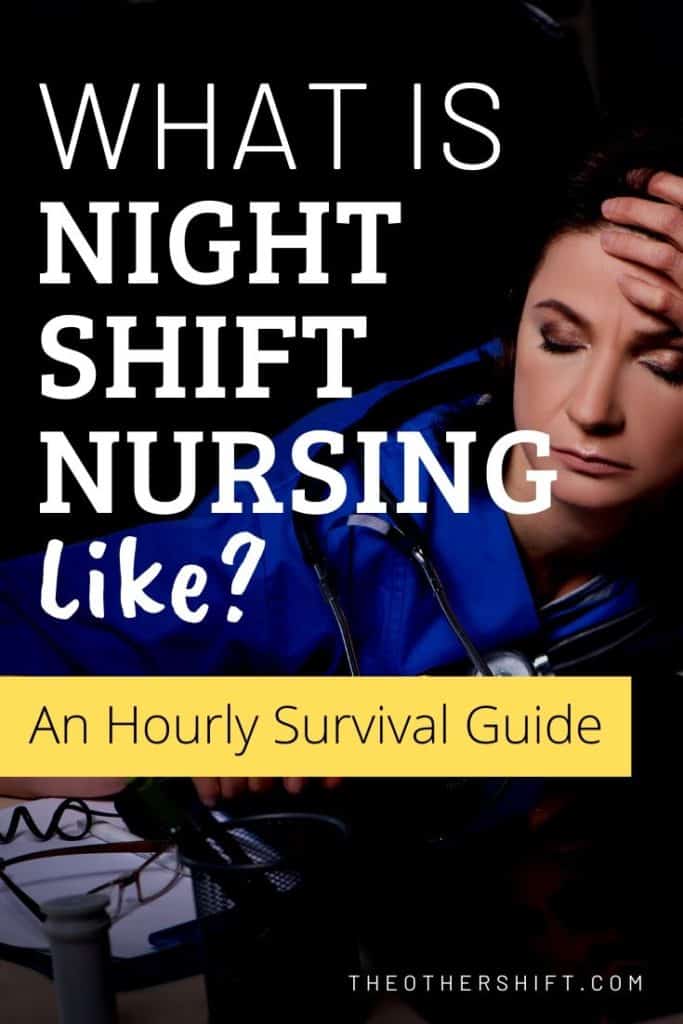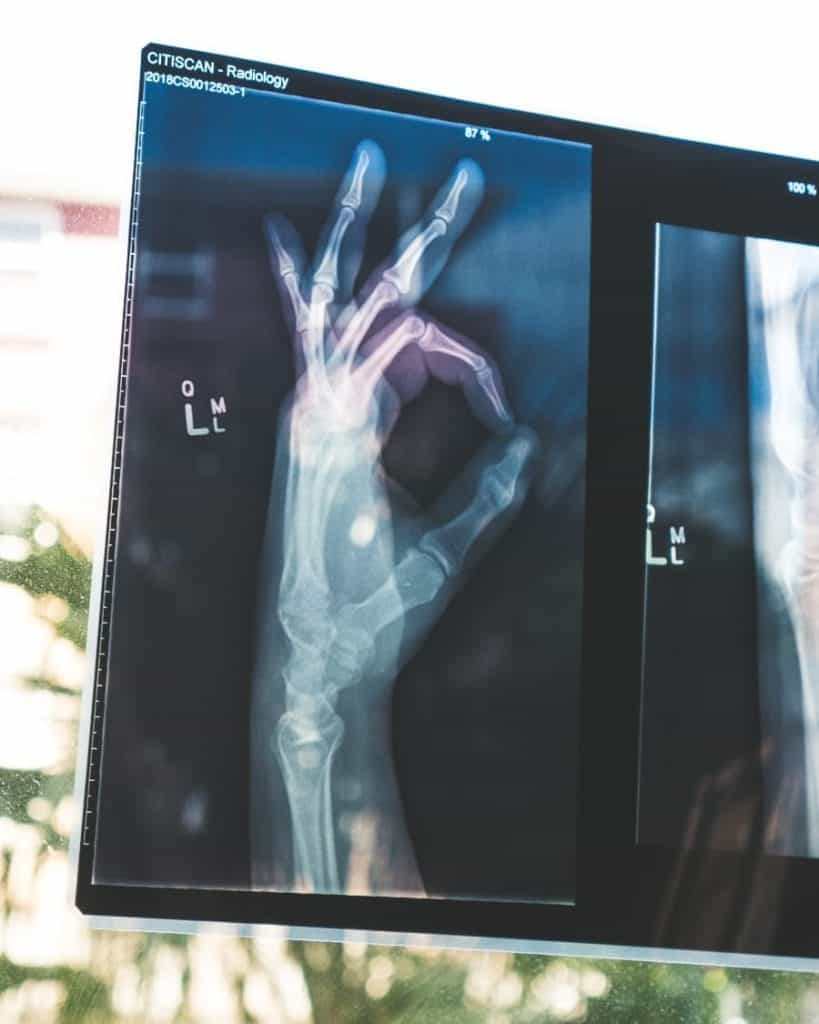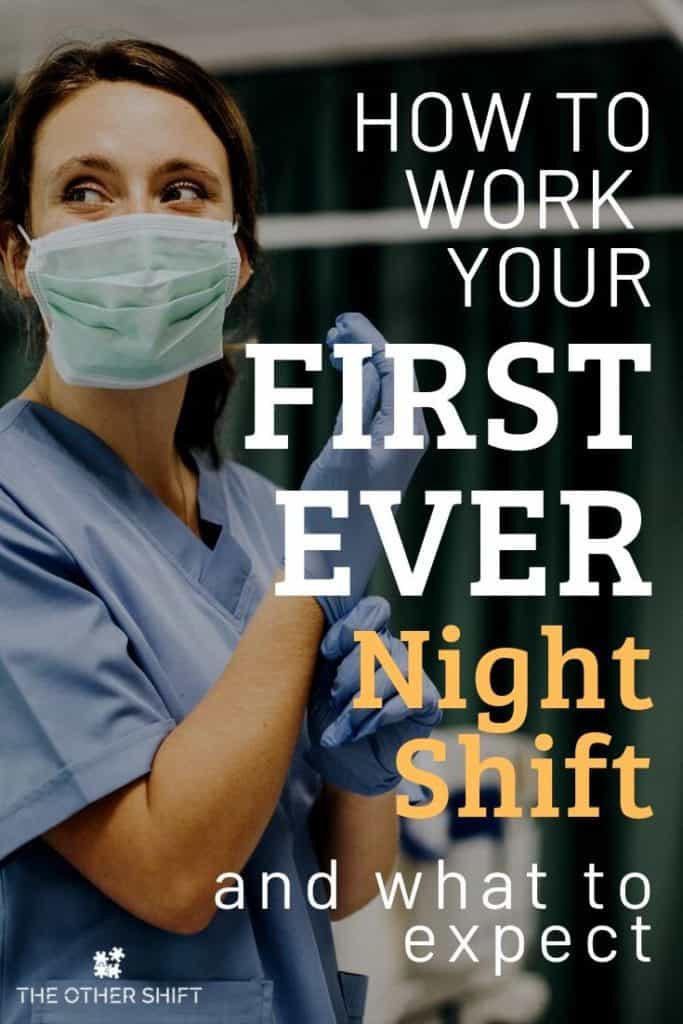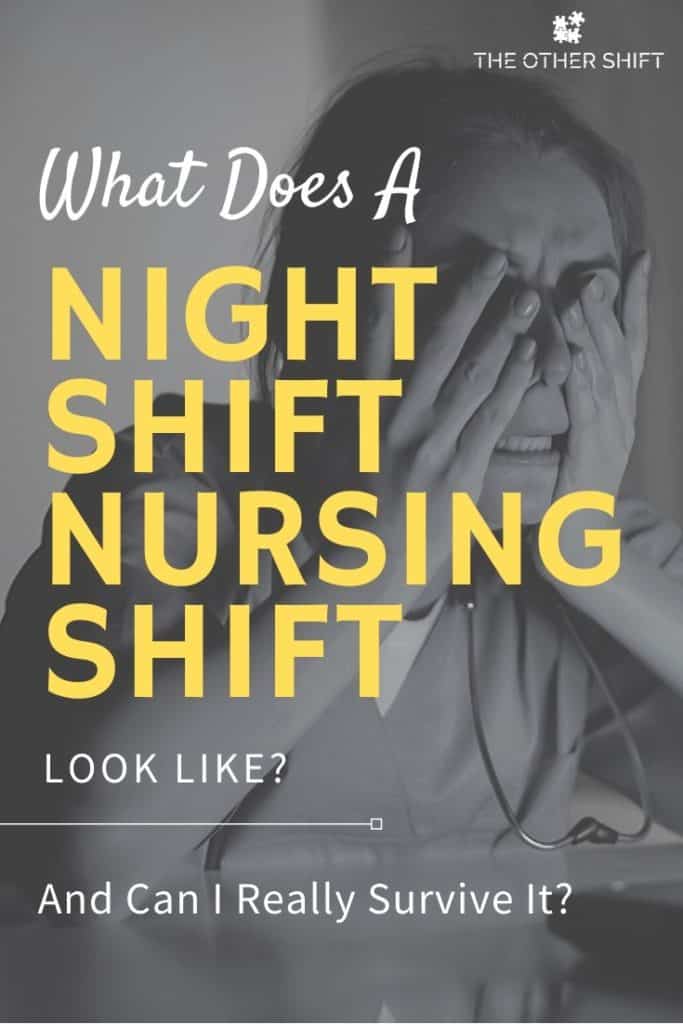Disclosure: This page may contain affiliate links, meaning we receive a commission if you decide to make a purchase through our links, but this is at no additional cost to you. Please read our disclosure and privacy statement for more info.
If you haven’t been “lucky” enough to work the night shift as a nurse, it can seem pretty daunting the first couple of times. Do patients sleep? Does it get lonely? Is there a routine when working night shift as a nurse? Am I going to be able to stay awake?

Night shift nurses have the same duties as daytime nurses; administer timely medications, accurately document and respond appropriately to patients. Though they have access to fewer resources and help, coupled with strain from working against their traditional body clock.
Depending on the ward/unit you’re working, your shift can look significantly different. I work predominantly in the ER but spend some time on the wards too and I can tell you the difference between the two is enormous. But there are some interesting similarities which are important to know, regardless of where you work.
So throughout this post, I want to explore a typical 12 hour night shift from 7pm – 7am (1900 – 0700) with some insider tips along the way. Just remember as you read through the post that depending on where you are working, expect some variations.
1900 (7pm)
Receive report from the day shift. Check the medication chart and make sure everything has been signed for. Ask questions but don’t judge what hasn’t been done and thank them for what has been completed.
There will come a night where you will give a “bad handover” due to unexpected issues so it’s not your job to judge.
Related post: Being a New Nurse is Hard. How to Stop Feeling Incompetent (Part 1 of 3)
Start planning your night. Get a good idea of who needs what and when. Think about:
- Post-surgery observations
- Tests needing to be completed overnight
- Does anybody require dialysis?
- Who requires AM labs? (blood tests)
- Is anybody needing regular turns overnight?
- Do I need to administer any preps overnight? For example a colonoscopy?
- Is anybody NPO (fasting) past midnight?
- When are my medications due? (major medications pass are usually at 2200 & 0500-0600)
- Is anybody a diabetic?
- Does anybody have a drain tube/s?
- Are there any families/patients frustrated and angry with the care which needs addressing ASAP?
I always ask myself at this point “who is my sickest patient?” Knowing this allows me to priortise and not miss any important changes if they occur.

2000 (8pm)
The next hour is about meeting all your patients and diving into completing your head to toe assessments on everyone.
This will seem like it’s never-ending because the ratio is generally larger overnight, but don’t rush this process. The better you get to know your patients and the presenting problems now, the easier your shift will be.
You will also obtain vital signs from all your patient’s (potentially with the help of your nursing assistant if you have one), taking note of any trends in their vital signs throughout the day. Are they becoming hypotensive and nobody has noticed?
During this time you will also review your doctor’s orders, working out what has been completed by day shift and what didn’t.
Around this time you’ll also be helping patients get ready for bed. Some will need more help than others so err on the side of caution as you’ve only just met. Do they need a frame and good footwear? Probably.
Giving medications may also be relevant here too. Often the day shift has helped out by giving your 2000 medications, however sometimes they just won’t get to them or it’s not appropriate.
Be mindful, some medications may need to be given with or without food. Finally, be aware of medications that need to be withheld due to a procedure the following day.

2100 – 2200 (9-10pm)
These few hours will fly by! You’ll feel like you’ve walked 10000 steps already and it will only be 2200!
During this time you’ll do the following:
- Administer PRN medications like pain relief drugs and medications to help them sleep
- Check BSL’s for unstable diabetics
- Help patients get changed, visit the bathroom, apply incontinence pads and brushing their teeth
- Remove dentures and hearing aids, putting them in a safe location (labeled)
- Prevent falls overnight by setting up the room equipment suitable for sleeping
- Make sure the patient’s have access to the call bell, bars and bed rails if appropriate
- Ensure pressure injury techniques have been considered, like elevating the heels and using pressure prevention dressing such as this Heel Dressing on Amazon. (#ad)
- Calling family members to update them of progress if necessary
Related post: Always Sick as a New Nurse? 10 Tricks to Beat The Blues (Part 2 of 3)

2300 (11pm)
You will probably have all your patients tucked happily in bed by this point. But if you don’t that’s totally okay! Some nights nothing will go to plan, often caused by something totally out of your control. Don’t sweat it. It’s not a race.
Once your patients are in bed, or at least in their pyjamas, it’s time to chart. Update care plans, chart your head to toe assessment and complete the other necessary paperwork.
You probably won’t have time to really dive into their past history and learn more details about them so don’t get bogged down, there will be time later on, hopefully.
Here are some other jobs you’ll likely come across at this time:
- Answer call lights
- Attend to new admissions either directly from another hospital or from the ER
- Finish up giving any medications
- Sit them older folk, comforting them in this new environment

2400 – 0100 (12-1am)
The charting continues. It will seem like it never ends! From care plans, progress notes, skin integrity forms – the list just goes on. But it’s our job to make sure this is all fully completed, legible and up-to-date. Like they say…
“if it’s not documented, it didn’t happen.”
You will also give weirdly timed medications like IV antibiotics and complete bedside rounding during these hours. Again, depending on the facility, it will be expected that nurses complete patient rounding on a set schedule. Suss out what this schedule is as it’s embarrassing if you get reminded about it by the morning nurses the following day…
Related post: Advice for New Grad Nurses: How to Stop Feeling Like an Idiot (Part 3 of 3)
Depending on how your shift is structured, now might be the time you have your next break. Remember your digestive system is “resting” and is in “hibernation mode”, so eating something like soup (very hydrating!) or drinking a smoothie is best as it’s easy to digest.
Don’t order pizza, buy a burger from the nearest take out and even avoid big bowls of pasta as it can cause you to feel bloated and super sleepy. Remember to set a timer or make a mental note of when your break finishes so you don’t cut into somebody else’s break time.
Here are a few posts which can help explain what to eat overnight:
- Why am I So Bloated on Night shift?
- 6 Healthy, Freezable Shift Work Meal Ideas for Beginners
- When Should I Eat on Night Shift?

0200 – 0400 (2-4am)
During these wee early hours of the morning, you will start to feel a “chill.” This is your body’s way of preserving energy, as we are supposed to be sleeping.
Naturally our body temperature “dips” around 3-4am so it’s wise to bring a sweater or wear your lab coat if you have one. (source)
From a nursing perspective, most of your patients will be asleep but there is always one or two wandering the halls, watching TV or visiting to the bathroom. If necessary, you will be required to:
- Roll your patients and attend to pressure area care
- Change incontinence pads
- Check and record drain tubes
- Give pain medications
- Call the doctor to obtain an order or to voice a concern
- Pick up a patient from ER as a new admission
- Sit and comfort patients experiencing Sundowners Syndrome, delusions or other mental health issues.
- Continuously cardiac monitor patients and adjusting leads were necessary
I have worked many nights where I am running around like a headless chook at this time and others I am sitting at the desk checking BSL machines because everyone is asleep. It’s crazy how different one night can be from the next.
At around 4am you’ll hit the danger zone. This is the time you’ll feel tired and fatigued. Avoid completing the most tedious or repitious tasks during that time. Stay active by climbing the stairs, talking to your co-workers or doing some nurses-sation yoga, etc. This is a great time to remember – I am getting paid more for this.

0500 (5am)
You might start hearing some rumblings particularly from the older folks who need to use the bathroom.
During these hours you will be:
- Making cups of tea and coffee
- Attended to vital signs if somebody feels “off”
- Getting your patients ready for surgery or testing. You may need to complete surgery checklists, MRI safety lists and physically prepare your patients with appropriate ID bands and clothing.
- Drawing and sending AM labs
- Completing documentation
- Giving early medications such as IVABS

0600 – 0700 (6-7am)
You are so close!
During this last hour, it will be all action. You will think you don’t have it in you but keep drinking water, turn all the lights on and remain focused – I promise you’ll make it.
You will be giving medications, so slow down and double-check everything. Mistakes happen when we are fatigued so get a second pair of eyes to assess your calculations if you feel it’s necessary.
You will also be checking BGLs and helping patients shower if they are for early morning discharge.
More and more patients will start to walk around and the noise in your unit will slowly increase from eerily silent to mimicking a classroom of kids! This can feel overwhelming but just keep going.
At around 6.45am start preparing for report using the ISBAR (Identify, Situation, Background, Assessment and Recommendation) format. Ask yourself the following?
- Do I know the plan for each and every patient?
- Have I signed for all the medications?
- Did I complete the care plans and fluid balance chart?
- What are their current issues for discharge (lives alone, limited support, newly fractured limb, etc)?
[VIDEO] – I wanted to provide a video example of how your report could look. You’ll be tired and exhausted, often leading to a confusing handover where information can get missed. Below is a great example of how you should structure your report using the ISBAR format.
This post titled, How to Work Your First Ever Night Shift and What to Expect is also full of general tips for shift workers working irregular hours and it’s worth a look.
Keep Reading:
- What Do I Need For Working Night Shift? 13 Essential Tools
- How To Handle Working Overnight. 9 Night Shift Tips And Tricks
- 7 Essential Night Shift Tips: Making The Impossible A Reality
- Best Shoes for 12-Hour Shifts to Stop the Aches and Pains
Summary: What is Night Shift Nursing Like? An Hourly Survival Guide
I hope this hour-by-hour report has given you a good indication of what night shift nurses do and how you can find your own routine.
Night shift may seem daunting but the people you meet and the situations where you are forced to improvise and think on your feet will make a better, more resilient nurse in the future.
Well, that’s what I tell myself anyway!
Good luck with your first night shift.
Cheers,
Emma
Disclosure: This page may contain affiliate links, meaning we receive a commission if you decide to make a purchase through our links, but this is at no additional cost to you. Please read our disclosure and privacy statement for more info.



